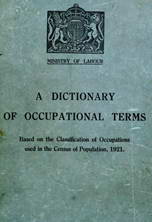A Dictionary of Occupational Terms Based on the Classification of Occupations used in the Census of Population, 1921.

ORDER VII.—METAL WORKERS (NOT ELECTRO PLATE OR PRECIOUS METALS)
Sub-order 8.—Other Workers
265.—Tool Makers
Back to List of Occupational Codes
- die sinker (tool making
- a highly skilled tool maker q.v. specialising in manufacture of dies, chiefly for use in ornamental metal work, such as chandeliers, lamps, etc.; turns to shape on lathe, grinds or mills in milling machine and finishes with hand tools at bench; cf. die sinker (230).
- gauge maker, gauge plate maker
- a highly skilled craftsman drawn from grades of turner (200), fitter (210) or scientific instrument maker (322) q.v. who has specialised in accurate work: shapes a piece of hard steel to rough size of gauge or template by means of lathe or other machine tool; grinds gauge to approximate dimentions [sic] required, on a precision grinding machine and, with great care, finishes to exact dimensions by delicate hand tools; always works to very definite sizes and passes his work by use of micrometer, or with' even finer gauges than those which he is engaged in making; sometimes specifically designated, e.g., tyre gauge maker.
- jig maker
- a tool maker q.v. who specialises in jigs, i.e. tool guides or templates for repetition work; cuts steel plate, according to blue print, with guillotine, shears and hack saws; drills and punches jig as required after accurate measurement; assembles and screws together parts, if jig made in parts; sometimes case hardens bush of each hole and all edges, see case hardener (220).
- jig and gauge maker
- a gauge maker q.v. making both jigs and gauges.
- tool fitter
- a tool maker q.v. in smaller engineering shops, cutting tools for lathes from tool blanks; may also set up lathe.
- tool maker, engineers' tool maker
- (i) makes dies, punches, etc., for press tools, or, lathe tools, drills, reamers, etc., throughout, from tool blanks, by forging, dry grinding, hardening, tempering, and wet grinding, turning, milling, shaping, and fitting; turns, mills, and grinds jigs and gauges; sharpens edges of tools bought from other firms;
- (ii) designs tools, and passes blanks to tool smith (190) q.v. to forge; superintends work of smith (190), grinder (237), turner (200), hardener (220), temperer (220), etc., and tests accuracy of their work;
- (iii) fits and erects lathes and other machine tools;
- (iv) general term for any specialised mechanic making lathe tools, jigs and fixtures, gauges, etc., in engineers' tool making shop, including miller (200), turner (200), hardener (220), grinder (237) q.v.;
- (v) cf. machine tool maker, press tool maker, jig and gauge maker, die sinker.
- tool maker, machine
- general term for any worker, e.g., borer (200), grinder (237), gear cutter (200), miller (200), planer (200), fitter (210), turner (200) q.v., specially engaged in manufacture of machine tools, such as lathes, drilling machines, shapers, grinders, etc.
- tool maker, press
- (i) is employed, usually in sheet metal work-shops, to make press tools or dies for use in conjunction with power-driven or hand-operated presses;
- (ii) superintends work of turners (200), grinders (237), etc., q.v. engaged in manufacture of such tools.
Back to List of Occupational Codes
From:
A Dictionary of Occupational Terms Based on the Classification of Occupations used in the Census of Population, 1921,
Ministry of Labour, 1927. Digitised by Peter Christian, August, 2016. This text is in the Public Domain. 
